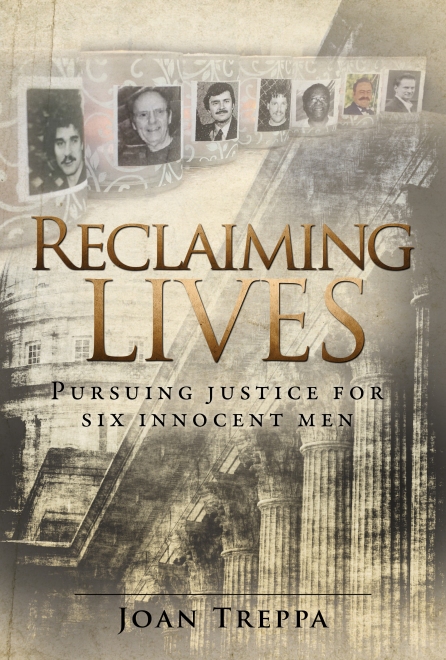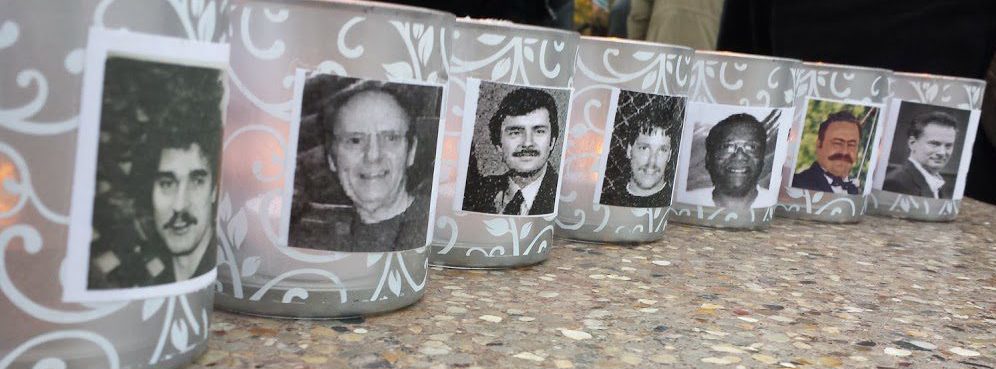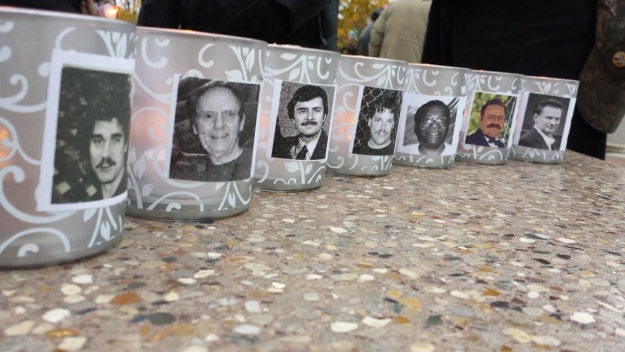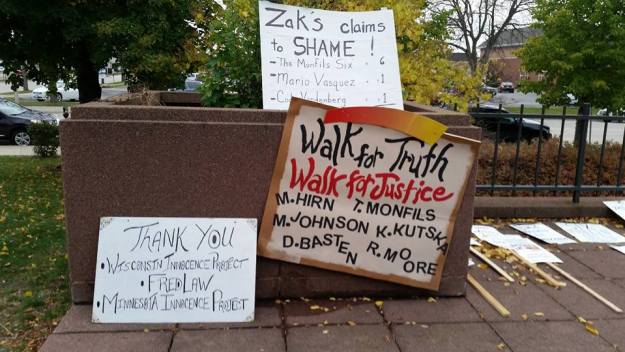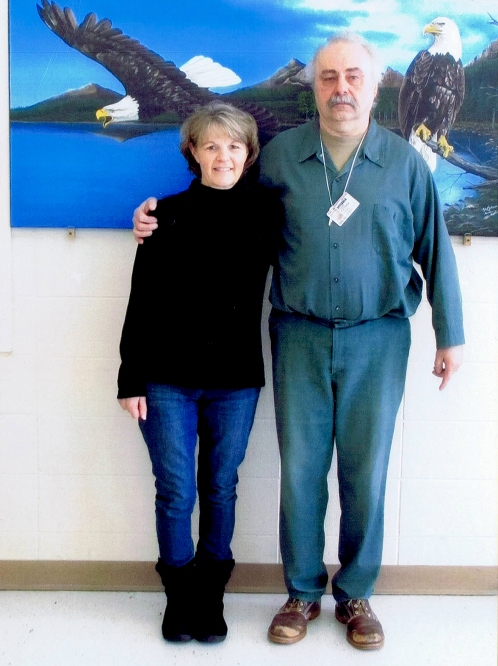Greetings and Happy New Year!
One of my goals in 2017 is to remain optimistic that this will be an exceptional and unprecedented year for ongoing efforts regarding our five innocent Wisconsin men; Keith Kutska, Dale Basten, Michael Hirn, Reynold Moore, and Michael Johnson.
There is much to be hopeful about despite a recent setback in our mission to request a new trial for one of those five, Keith Kutska. On December 28, 2016, we received word that Keith was denied justice as the Wisconsin Court of Appeals affirmed his conviction, barring him once again, the right to present new evidence in a new trial.
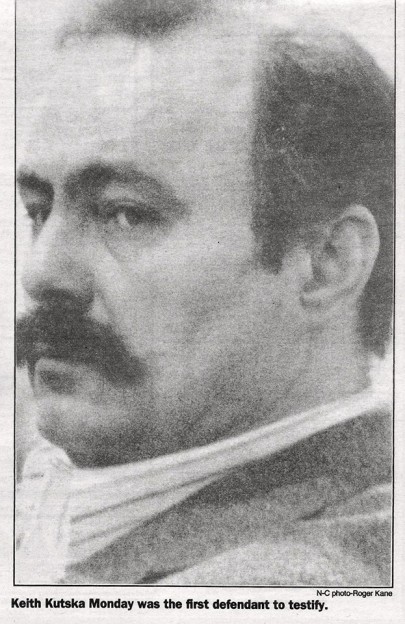
During the trial in 1995. (Photo Courtesy of the Green Bay Press-Gazette)
Green Bay’s WLUK Fox 11 coverage included the following excerpt from that court’s decision:
“Kutska requests a new trial in the interest of justice. Because he failed to establish ineffective assistance of counsel or newly discovered evidence, that motion is procedurally barred. In addition, he has not established that the real controversy was not fully tried or that, because of trial error, it is probable that justice miscarried and a new trial would produce a different result.”
Here is the link to the entire Court of Appeals decision.

Ink sketch of Tom Monfils by artist/writer, Jared Manninen
A reminder that none of these men were granted separate trials to begin with, which in my opinion is a denial of a basic constitutional right. But let’s examine what I understand to be “the real controversy” in this earnest attempt to achieve justice; the idea that Tom Monfils’ death could have been a suicide. Those of us who support the innocence of all six men believe there’s plenty of evidence to show that suicide is a plausible explanation of what happened. We may never fully understand the scope of the circumstances leading up to his death but the science, the witness testimony, and the human interaction that occurred at the mill on that day in 1992, support this theory.
I believe the dominant reason for the resistance by the courts to allow progress in this case is pride. Simply put, they don’t want to admit that they’ve prosecuted, convicted, and incarcerated these men in an unethical and unlawful way. But the heart of the controversy among the general public seems to rest on misguided opinions and an inability to accept the suicide theory because of the taboo in our culture on the subject. Many are simply uncomfortable and even offended by the idea that someone would take their own life. In regard to the Monfils case, I often hear comments by those in support of the murder theory that no one in their right mind would commit suicide in the manner that Monfils died. But that idea falls flat because no one contemplating suicide is ever in a right frame of mind. At the given time, the victim will use whatever means is available or familiar to them, which is what appears to have happened in this instance with the rope and weight material. Many do not realize that the weight used was the one that was near Tom Monfils work station. And the rope, well, that was Monfils’ own jump rope.
Based on the statements included in the court’s decision, the resistance to have a conversation about suicide when it is staring them in the face is troubling. And knowing that consideration was never given to the idea of suicide was never brought up during the 28-day trial is baffling.
According to the court’s decision, “(Tom) Monfils’ family’s opinions (as stated by the brother, Cal Monfils, during his testimony at the evidentiary hearing in 2015) regarding his possible suicide consisted of hearsay and speculation.” And, “In light of Young’s (the medical examiner) conclusions, trial counsel’s decision to forego presenting a suicide defense constituted a reasonable trial strategy, particularly given the questionable admissibility of the non-expert evidence supporting the suicide theory.”
Having spoken with people who’ve dealt with suicide within their own families, the shame and profound guilt of those left behind is evident. They wonder why they were not aware and if there was something they could have or should have done to prevent this tragedy. The subject is painful, disturbing, and often avoided no matter the probability of its likelihood. But these influences should not blind any of us, untouched by its effects, to the possibility of suicide in this instance.
Statistical analysis favors our argument: According to the American Foundation For Suicide Prevention, “Suicide is the tenth leading cause of death in the United States” and is highest in middle-aged white men. “Each year, 44,193 Americans die by suicide.” In Wisconsin, it’s the fourth leading cause of death in persons aged 35-54. (Monfils was 35 when his life ended.) “Over four times as many people die by suicide in Wisconsin annually than by homicide.”
At this moment, we’re disappointed about the latest ruling but we are far from over and out and we will continue to exert a relentless stance in our quest to succeed. We have no illusions about the uphill battle we still face but if we can help it, we will never allow this injustice to persevere. We will take the plunge back into indeterminate waters as our mission expands to new levels of awareness and farther up the judicial ladder in 2017.
A petition to the Wisconsin Supreme Court is our next step. If this request fails, the legal team will pursue relief in the federal courts where the sixth man, exoneree Michael Piaskowski, obtained justice in 2001.
Until then, here’s a recap of upcoming events that I hope will greatly support these efforts. Two documentaries that will heighten awareness of this case are on the horizon and will be completed in the coming years.
Beyond Human Nature is an examination of the human element and the interaction of the individuals involved on either side in the Monfils case. Father and son team, Michael and Dave Neelsen of StoryFirst Media, based in Madison, Wisconsin are producing this project. Completion is expected in 2020.

(Banner courtesy of StoryFirst Media)
Guilty Until Proven Innocent examines how wrongful convictions occur. Multiple cases, including the Monfils case, are reviewed in this project. Mark Saxenmeyer; CEO of The Reporters Inc, based in Minneapolis, Minnesota is the producer. Because of our involvement in the Monfils case, I and friend and colleague, John Johnson, were interviewed for this project. Specific dates of completion and distribution are still unknown.

(Photo courtesy of The Reporters Inc)
My tool of awareness is the book I’ve sought to complete in the past four years. This factual depiction of events from my perspective is a sequel of sorts to the 2009 publication of The Monfils Conspiracy. Mine is a testament of the courage and perseverance of many I’ve met along the way who’ve experienced the ill-effects of a wrongful conviction.
Because of my specific interest and involvement in the Monfils case, I impress upon my audience the urgency of taking action on behalf of the unfortunate victims in addition to the men themselves; their families and close friends, people who led lives similar to ours before this tragedy befell them. I urge all to give credence to their long-standing predicament as well as to the devastation exacted on innocents everywhere.
In November of 2016, I submitted my transcript of this troubling story to Mill City Press; a self-publishing company in Minneapolis. After finalizing an evaluation of the transcript, I received an astonishing overview. My story was regarded as having been “written well” and executed “professionally and tactfully” from a “facts only” perspective.
I will post updates and specifics on all of these projects as they materialize.

Early Spring sunrise on Laddie Lake, Blaine, MN (USA)
There are many uncertain variables at this stage but what an adventuresome and progress filled year this will be!
